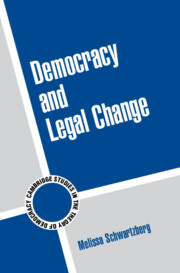Book contents
- Frontmatter
- Contents
- Acknowledgments
- 1 Introduction: Explaining Legal Change and Entrenchment
- 2 Innovation and Democracy: Legal Change in Ancient Athens
- 3 Legislation and Law Reform in Seventeenth-Century England
- 4 Fallibility and Foundations in the U.S. Constitution
- 5 Protecting Democracy and Dignity in Postwar Germany
- 6 Conclusion: Defending Democracy Against Entrenchment
- References
- Index
6 - Conclusion: Defending Democracy Against Entrenchment
Published online by Cambridge University Press: 24 July 2009
- Frontmatter
- Contents
- Acknowledgments
- 1 Introduction: Explaining Legal Change and Entrenchment
- 2 Innovation and Democracy: Legal Change in Ancient Athens
- 3 Legislation and Law Reform in Seventeenth-Century England
- 4 Fallibility and Foundations in the U.S. Constitution
- 5 Protecting Democracy and Dignity in Postwar Germany
- 6 Conclusion: Defending Democracy Against Entrenchment
- References
- Index
Summary
In the last four chapters, we have examined four historically salient views of the way in which legal change was understood as a fundamental activity of democracy and the ways in which these views of democracy gave rise to efforts at entrenchment. In providing these accounts of the way in which democracies decided to entrench or to preserve the flexibility of their laws, I hope that I have demonstrated that the capacity to change fundamental laws and institutions is an essential and attractive democratic function. We should not regard the impulse to modify these norms as necessarily rooted in akrasia, or passion, but a critical activity of democracy, affirmed repeatedly and justified for good theoretical reasons. Although the choice to entrench norms is understandable, particularly after tragic experiences, there are few reasons to believe that entrenchment will either save us from our worst impulses or improve upon our best. Legislators and constitution framers have extended entrenchment to a variety of provisions since ancient Athens, yet entrenchment's legacy is in no small part the protection of the narrowly instrumental and the manifestly unjust. Entrenchment may hamper moral and legal progress, encouraging citizens to view norms (and framers) as infallible. At its best, it merely shifts the locus of change from legislatures to courts.
Recall that the four defenses of flexible law are as follows: on the grounds of innovation, as we saw in Athens; as a deliberate legislative activity engaged in parliaments, in England; as a means of recognizing human fallibility, as in the American founding; and as a means of ensuring democratic engagement and deliberative legitimacy in the postwar era.
- Type
- Chapter
- Information
- Democracy and Legal Change , pp. 193 - 210Publisher: Cambridge University PressPrint publication year: 2007

